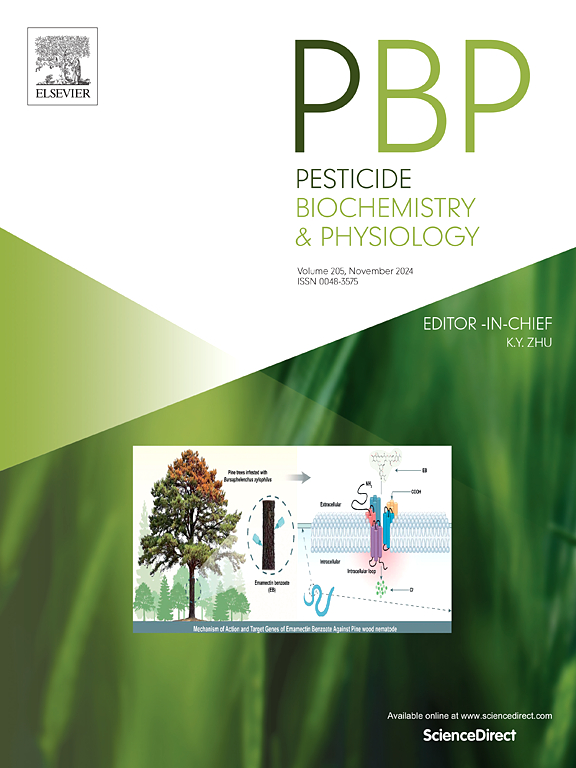Suppression of Adipokinetic hormones enhances Ascovirus HvAV-3h killing speed in Helicoverpa armigera
IF 4.2
1区 农林科学
Q2 BIOCHEMISTRY & MOLECULAR BIOLOGY
引用次数: 0
Abstract
The emergence of pesticide resistance in Helicoverpa armigera and other pests represents a challenge, necessitating continued development of innovative insecticides. Ascoviruses are a potential insecticide for H. armigera. These double-stranded DNA viruses cause cell death and lethal disease in infected larvae. However, this disease is chronic and prolongs the lifespan of the infected larvae by several weeks. The slow killing speed limits the success of these pathogens in the insecticidal market. Here, we demonstrate that the dsRNA silencing of H. armigera neuropeptide Adipokinetic Hormones (HaAKH) accelerates the killing speed of Heliothis virescens ascovirus 3h (HvAV-3h) against the third-instar larvae of H. armigera. The LT50 was reduced to 3.96 days in larvae with silenced HaAKH1 and 4.7 days in those with silenced HaAKH3. Moreover, the histopathological examinations revealed the destruction of the host's fat body and epidermal tissue shrinkage after HaAKH silencing during HvAV-3h infection. Examining detoxification and antioxidant enzyme activity in HvAV-3h infected larvae showed reduced detoxification mechanisms after HaAKH gene silencing. Furthermore, the silencing of HaAKH resulted in an overall reduction in the fold changes of proline dehydrogenase. In conclusion, this study demonstrates that the ascovirus killing speed can be accelerated by interfering with the host neuropeptide-related gene expression. Moreover, the silencing of H. armigera HaAKH1 and HaAKH3 decreased the antiviral immunity against HvAV-3h.

求助全文
约1分钟内获得全文
求助全文
来源期刊
CiteScore
7.00
自引率
8.50%
发文量
238
审稿时长
4.2 months
期刊介绍:
Pesticide Biochemistry and Physiology publishes original scientific articles pertaining to the mode of action of plant protection agents such as insecticides, fungicides, herbicides, and similar compounds, including nonlethal pest control agents, biosynthesis of pheromones, hormones, and plant resistance agents. Manuscripts may include a biochemical, physiological, or molecular study for an understanding of comparative toxicology or selective toxicity of both target and nontarget organisms. Particular interest will be given to studies on the molecular biology of pest control, toxicology, and pesticide resistance.
Research Areas Emphasized Include the Biochemistry and Physiology of:
• Comparative toxicity
• Mode of action
• Pathophysiology
• Plant growth regulators
• Resistance
• Other effects of pesticides on both parasites and hosts.
文献相关原料
公司名称
产品信息
索莱宝
ProDH activity assay kit
索莱宝
CAT activity assay kit
索莱宝
POD activity assay kit
索莱宝
SOD activity assay kit

 求助内容:
求助内容: 应助结果提醒方式:
应助结果提醒方式:


